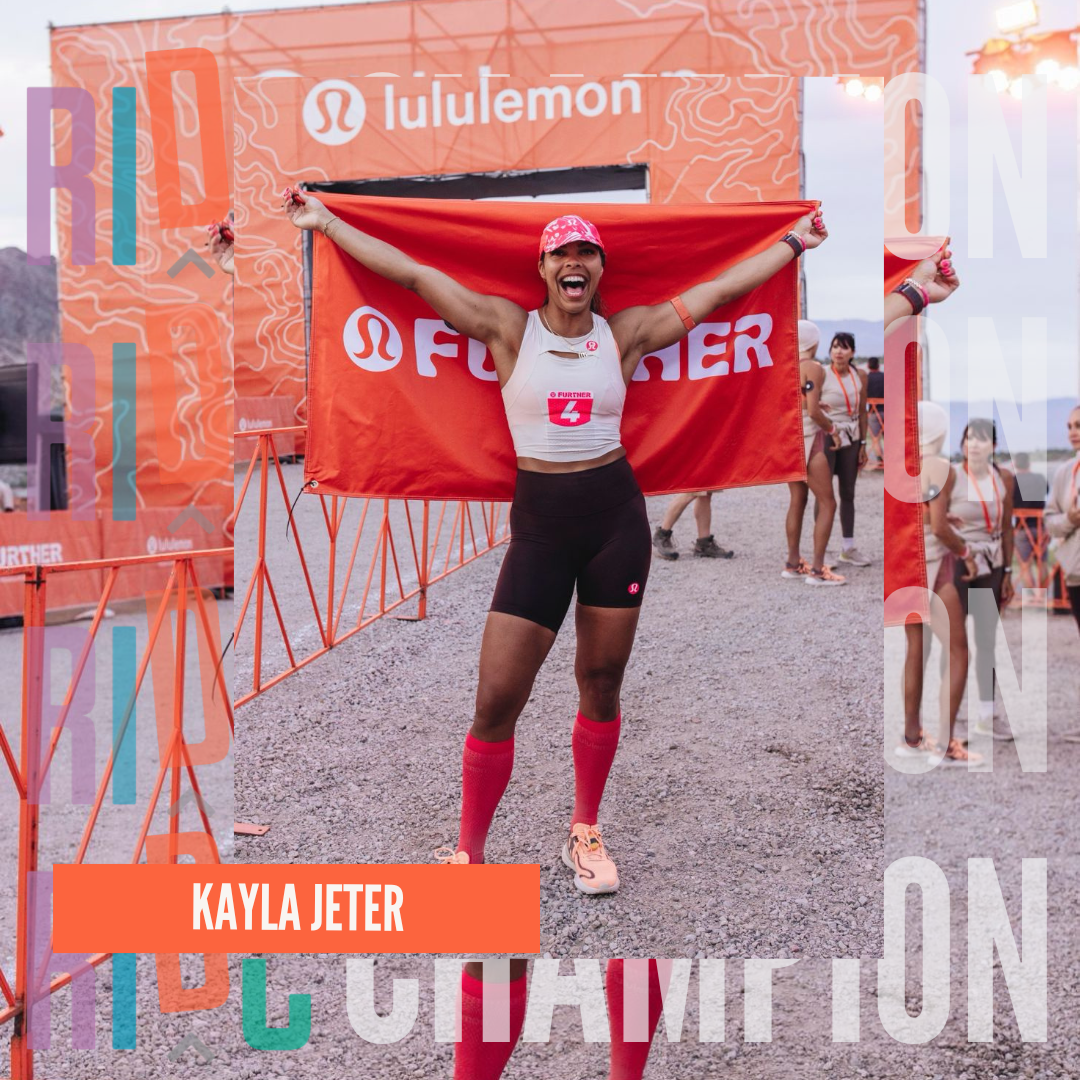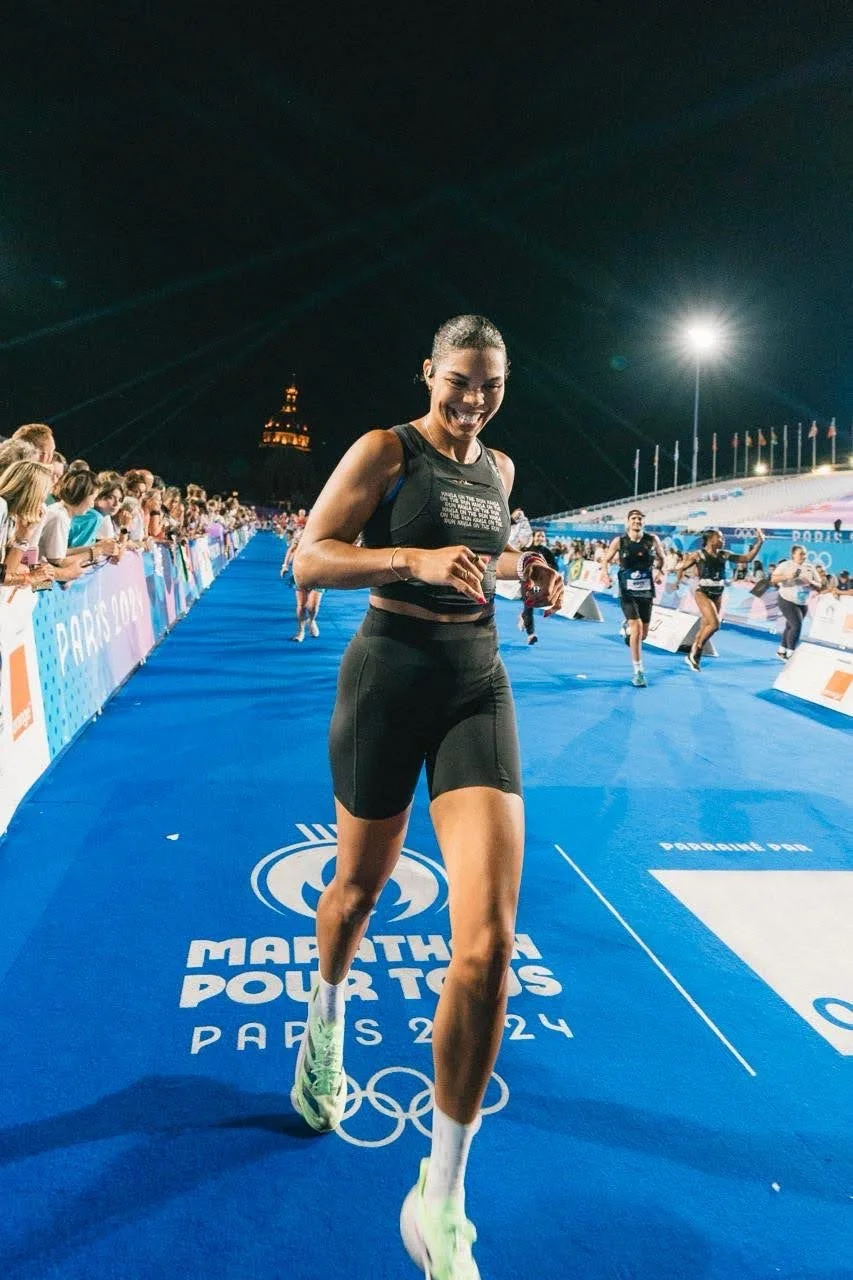RIDC Champion: Kayla Jeter
By Amy DiTommaso
An RIDC Champion is someone who is actively doing the work of the mission and vision of our organization and is a living example of the goals we have.
Our next champion is Kayla Jeter. Kayla is an athlete, a coach with the training app Runna, and a fierce advocate for women’s health, both physical and mental. She is also the creator of 100MilesofSummer, a yearly challenge to encourage people to get outside (or inside!) to move their bodies and explore the places they inhabit. Kayla uses her platform to inspire people to be their best selves and to show others that it’s not about the distance but the people you are sharing the miles with. And did we mention she was part of the epic Lululemon FURTHER ultramarathon team?! We were so lucky to get to hear from Kayla about many of her recent adventures as well as some exciting new things she has in store for everyone.
Running Industry Diversity Coalition (RIDC):When and how did 100MilesofSummer come to be?
Kayla Jeter (KJ): 100MilesofSummer started in the summer of 2018—my first summer in Chicago. I’d just moved to the city the previous fall with no car or understanding of public transit but knew once summer arrived, I wanted to explore the city by foot just as I did so intimately when I was playing professional volleyball in Finland. Exploration of outer and inner landscapes is the journey of the 100MilesofSummer, who you get to share it with—whether that be self or others—is what gives the miles meaning.
Photo Credit: Jayson Suarez (@notafraid2fail)
RIDC:What do you find most inspiring about 100MilesofSummer?
KJ: The community. Not by numbers but by the way they show up day after day, week after week, month after month, and, as we prepare for the 2026 season—year after year. Through the brutal summer heat and unexpected rain storms, shoes are laced up because the miles serve a greater purpose than completion. They represent a commitment to self and, for many, a version of themselves they’ve haven’t yet met but aspire to be. This challenge wasn’t designed for seasoned runners or marathoners, it’s for those who don’t consider themselves a runner because of lack of representation or insecurity in hitting the pavement, paths, trails, and treads. That running was and still in some moments is me. Every step rewrites the narrative and claims, “I belong here, too.” (photocred:Jayson Suarez @notafraid2fail)
RIDC:Please tell us a bit more about your personal journey with movement and how that may have changed throughout the years.
KJ: Movement has always been part of my life. My dad played in the NFL and my mom always encouraged us to “get out of the house”—which was probably to get a moment to herself or have a quiet house, but still, the nudge kept me and my sisters moving. I started playing volleyball in seventh grade, in admiration of my older sister who was the first to play, and was noted as a standout immediately. The high school volleyball coach, who played volleyball in college, took me under her wing to properly train and develop my talent. I competed on club teams, often as the youngest athlete, traveling around the US, and was invited to pipeline USA training in high school. From an early age, my body has given me opportunities to find success in sport but also take up space. Volleyball wasn’t nearly as accessible or diverse as it is now back in 2006, when I made my first elite team. I went on to receive a full volleyball scholarship at the University of Tennessee—go, Lady Vols!—before playing professionally overseas for one season and ending my volleyball era as an assistant coach at the University of Cincinnati.
Once “volleyball player/coach” was removed from my identity, a period of time was spent exploring “movement” outside the context of competitive sport. I still trained with the same focus but with modified intensity, and maintaining strength training plus cardio development plus three-hour practice gladly was no longer my ministry. Creating my 100MilesofSummer challenge in 2018 was the first invitation for me to consider what movement looked like outside of high-level competition; to “go for a run” with no goal time or distance was a foreign idea. I didn’t know how to let go of the doing and settle into the being. The challenge has completely transformed my perspective of movement, serving as a place to connect with oneself and others, challenge oneself, and discover one’s own abilities, but also practice grace, care, and adventure—like trail running! By far the most present and humbling experience of running exists on the trails. Having run my first-ever trail race this past June in Seattle at the We Out Here Trail Fest was such a beautiful gathering and reminder that running, in all its landscapes, is for every race, pace, and face.
Photo Credit: Jayson Suarez (@notafraid2fail)
RIDC:We know it was last year, but our minds are still blown about FURTHER! Can you tell us what went into your decision to join, your goals for the event, and how life has been different since?
KJ: When you look at the body of sport science research, the gender data gap is shocking—only 4 to 6 percent of sport science research is focused solely on women. And if you zoom in on that already minuscule number, the percentage of Black female distance runners is even smaller. Saying “yes” to being one of the ten women selected to explore our individual human potential fully supported with resources typically reserved for men by lululemon in partnership with the Canadian Sports Institute Pacific wasn’t solely in pursuit of my athletic potential. I felt it was my responsibility as a Black woman in this space to contribute to the data to better serve my larger community. Historically, performance protocols on training, nutrition, recovery, and injury prevention are based on data from White males—two things I am not. As a design and data science nerd, working intimately with lululemon’s brilliant product innovation team and CSI-P’s esteemed researchers the year before the feat and during was a privilege of a lifetime.
My goals for FURTHER were the same for every race: 1. Finish uninjured 2. Finish with a smile, wanting to continue running. Only having run my first-ever marathon one year prior to the feat, I had no idea how far my body and mind could go. I just knew life has already primed me to be able to succeed in great challenges. In working with my ultramarathon coach and Dr. Megan Roche, we settled on 200 to 205 miles, depending on how my body responded.
Since FURTHER, my life perspective has not been the same. My brain chemistry shifted throughout those six days—that wasn’t studied but I 100 percent ended the feat as a different person than when I started. Life hasn’t necessarily been different, but I ask myself more frequently, “what is the purpose of [whatever I’m creating]? Where are the gaps? How can I fill them? What is the greater impact?” The support I received throughout the feat showed me the opportunity I have to significantly empower women, especially women of color/caregivers/grievers, so this summer, I launched a virtual educational webinar series with Black female doctors in running-related fields to provide research-backed guidance for a better run, from pelvic health to healthy menstruation.
RIDC:Post-FURTHER, where do you see successes and/or areas in need of improvement in the fitness industry when it comes to the inclusion of women and more specifically women of color?
KJ: Post-FURTHER, I’ve seen more women-centered conversations, celebrations, and races like Every Woman’s Marathon and the After Dark Tour be offered. I had the absolute delight of attending the inaugural Every Woman’s Marathon in November 2024 and was blown away by the support leading up to the race through their variety of training plans extending beyond traditional pace-based plans and, instead, meeting women where they were at: return to running, postpartum, etc. Those 26.2 miles throughout Savannah were a celebration of sisterhood, and I can’t wait to go back this November!
My hope is the fitness industry and its leaders look at FURTHER as an opportunity to shape/influence/lead with science-backed information. A lot of personal experiences are being sold to women as “the cure” and without the disclaimer of what I call “me-search” I feel it’s incredibly irresponsible and predatory to provide solutions without acknowledging individuality and without proper research. Especially in excluded and understudied populations, like Black women. For example, during my preliminary bloodwork for FURTHER, my results returned low vitamin D counts to which the researcher honestly commented, “Although your vitamin D is low, who’s to say it’s not within normal range for a person with melanated skin?” These types of considerations made me feel seen.
Secondly, women’s spaces yield sisterhood by vibes or genuine connection naturally. I think more can be done to not only gather women in the doing (running a race, participating in a class, attending a summit, etc.) but also support women in the being, through virtual communities or more local gatherings.
RIDC:What is an achievement you are most proud of?
KJ: When I tore my ACL my senior year of college, my athletic trainer told me I’d never be able to run a marathon post-surgery. It’s not that I wasn’t capable, but rather the training would be too stressful on my knee. Six marathons (London, NYCM, Chicago, Berlin, LA, Paris), three ultramarathon relays (Hood to Coast x 2, The Speed Project), two ultramarathons (Two Oceans, FURTHER) including a six-day race, a handful of half-marathons, and thousands of miles later, “my Golden Girls left knee” is still clicking on. And thank God, because although I never, ever imagined it, running would become part of my purpose, as a Black woman in this homogenous space, and peace.
RIDC:What are you currently working on and/or excited for? Aka what amazing things are you doing that we can help promote?!
KJ:I’m excited to share that I’ve joined Runna as one of their world-class running coaches. This opportunity lights me up in so many ways: being the first Black female coach on the roster; being a trusted resource in the run space; having my master’s in sport psychology and motor behavior; being a trained behavior change coach, RRCA-certified coach, Certified Functional Strength Coach, and current athlete mental health specialist for youth and professional athletes; and being able to cheer on millions of Runna’s PBs, start lines, and finish lines. I’m incredibly grateful for the opportunity and psyched for Runna’s continued growth in the US.
For those wanting to check out the platform, register using this link for two weeks free.
On the personal project side, despite being “on” social media I’m exploring long-format platforms to share more of my opinions, experiences, and adventures that I hope others take something away from to live a better life. My substack is called Healthy Hustle and I’m getting back on YouTube. I hope readers check both out!
Know someone who is an RIDC Champion? Reach out to amy@runningdiversity.com and share them with us!





